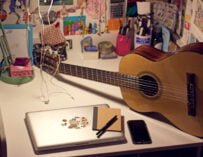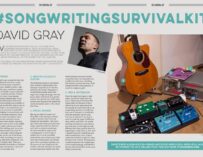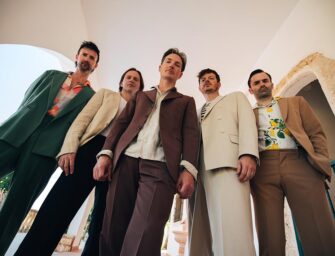The Sunderland post-punk band’s guitarist and vocalist, and self-professed muso, lifts the lid on the ingredients of his songwriting world
From the frantic post-punk delights of their eponymous 2004 debut album to the a capella stylings of 2012’s Rant (offering re-workings of the group’s own songs as well as a number of cleverly chosen covers), Sunderland’s The Futureheads were a welcome voice on the UK’s music scene; as inventive as they were hair-raising.
Having had their difficulties, the band now return with new album Powers. Singles Good Night Out and Jekyll bristle with tension and killer riffs and are instant reminders of why we all fell in love with the band 15 years ago. Here, guitarist/vocalist, and self-professed muso, Barry Hyde lifts the lid on his songwriting world…
1. SOLITUDE
I have never had the initial inspirations or you could say the ‘germs’ of a song appear when I have been in any meaningful company. Not once. I have added to those ideas in the rehearsal room in band collaboration or whilst teaching or playing guitar with friends, but the incredible excitement of those first euphoric moments happen to me only when I am alone. I’m sure this is entirely common with writers but worth mentioning! It seems these days I only ever get to have that creative loneliness late at night downstairs with an unplugged electric guitar, once my family are asleep. I once wrote a song on a very quiet shift while working on the checkout of a supermarket. I suppose it’s very common for songwriters to need to be alone to work but as I get older I have less time to indulge in the creative process. It’s helpful now for me to ‘make a date’ with myself and gently build up some anticipation and excitement.
2. OBSESSION/RUMINATION
Once I’ve had that initial breakthrough of having absolutely nothing to having absolutely something I find it difficult not to become obsessed. It’s like
an addiction. Over and over, sometimes with an instrument, but often as a rumination. Like a flea buzzing around my mind. For hours, days, weeks and sometimes months. Not constantly at the forefront of my consciousness though, thankfully, but always near and available. I can work on several things at once, starting up different ideas at any point waiting for the next section or phrase to jump out. If I’ve written a guitar riff or chord progression I can repeat it in my head, whenever I want to try and find the next bit of the puzzle. The rate of progress is seemingly random, one thing I can say is that I never want to settle
for the initial or obvious choice. That’s where the frustration comes. It’s a little bit like going insane but much safer and at the end of the day, ‘It’s only a song.’ This obsession/rumination process was particularly vivid for the songs I contributed to Powers the forthcoming Futureheads album.
3. EQUIPMENT/TOOLS
I don’t use the same method for every song but something that I did for the songs I wrote for Powers was make ‘home demos’. I have a set up including a workstation, speakers, an interface, a laptop, a computer monitor (this is really handy when using scoring software and a DAW at the same time), a MIDI controller, an excellent external hard drive containing orchestral samples, a Bluetooth keyboard and mouse.
When making electric guitar demos I use a tiny practice amp (Orange Crush 20), when recording piano demos I use a Roland V-Piano. I use custom made Gordon Smith guitars (ebony fretboard, stainless steel frets and set up with 12s with a wound G, ‘snuff brown finish’) and have a beautiful Auden parlour guitar I was sent. I don’t have hundreds – or even dozens – of instruments but what I do have is optimal and to some degree personal. Seemingly it’s important for me to have some kind of emotional connection to the instrument these days, whereas previously I couldn’t really care less about the instruments, more about the function rather than the possession.
Needless to say, a pen and notebook is also used, this is usually the final aspect of writing for me, I’ve never just sat and written some words out then turned them into melodies. My main objective with writing words is that they avoid being terrible. As long as they aren’t shockingly bad, I’m happy.
4. INSTRUMENTAL PRACTICE AND IMPROVISATION
I am a muso and I am proud. I love practising scales, arpeggios, making up my own exercises and exploring things like modes, contrary motion and chord cycles. I’m particularly interested in symmetrical scales at the minute, like Messiaen’s Modes of Limited Transposition and jazz harmony. Having this fascination keeps me interested in music in general, which makes me excited to write stuff that explores this new knowledge. The closing track on Powers is called Mortals and it uses a symmetrical scale that gives the chord progression Cmin/Cmaj, Emin/Emaj, G#min/G#maj. It’s really weird because this doesn’t happen with typical scales or modes. Messing about with this stuff feels quite daring but it’s old news in the classical world. Still, applying it to punk-influenced electric guitar music and four-part vocal harmony feels very adventurous.
Improvising is basically like constantly writing something that perhaps you will never play again, as soon as you repeat an improvised idea you are essentially going into composition mode. However, the ‘throw-away’ nature of improv can produce exciting results. Making those ideas subsequently ‘work’ is sometimes tricky but always thrilling. Sometimes songs will develop from the practising of specific playing techniques. My piano-led solo album Malody has lots of that going on. It is quite an innocent way of writing and I find that when I do something that I find surprises me I have the confidence to develop it further and eventually show it other people or record it. Learning the piano has opened me up to ideas that I would have never grasped with the guitar. It’s the ultimate instrument for unlocking the endless mysteries!
Read more Songwriting Survival Kits here


































Related Articles